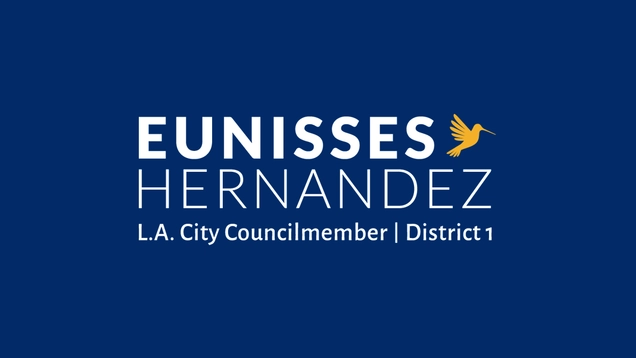
LOS ANGELES — Today, Councilmember Eunisses Hernandez was joined by Mayor Karen Bass, elected officials, City departments, and community members in MacArthur Park to announce the official launch of the Reconnecting MacArthur Park project. The initiative aims to close Wilshire Blvd to vehicular traffic and reconnect the two sides of the park, transforming the area into a vibrant, pedestrian-friendly, and green community space.
Hernandez was joined by a coalition of officials and residents to announce the launch of the first phase of the project, which will begin in August with a community engagement campaign and comprehensive traffic analysis to assess the impact of the proposed changes.
“Reconnecting MacArthur Park is not just about closing a street to traffic – it’s about opening up this neighborhood to the possibilities that come when we center people’s needs over the needs of cars,” said Councilmember Hernandez. “It’s about dreaming bigger and better for a community in critical need of deep investment. Expanding access to open green space builds climate resilience, improves public health and safety, and fosters thriving communities. This is just the first step of this initiative and we’re looking forward to working with the community and partners at every level of government to reimagine this space and improve the quality of life for all Westlake residents.”
“Angelenos deserve healthy parks and communities,” said Mayor Bass. “I commend Councilmember Hernandez for her commitment to this cause and for working tirelessly to make it a reality. We will continue to work closely with Councilmember Hernandez and our federal and state partners to envision the future of MacArthur Park and a healthier Los Angeles.”
“Reconnecting MacArthur Park will vitally expand public space for LAUSD families in the Westlake/MacArthur Park community, who often have little to no space for body movement, enjoying sunshine, and spending time outdoors,” said Dr. Rocio Rivas, LAUSD District 2 Board Member. “This initiative matches well with our vision to create green public schools to address park equity, combat climate change, improve mental health and boost physical wellness.”
"At LADOT, we recognize the impact transportation choices have on neighborhoods across Los Angeles, and especially in historically underserved communities like Westlake," said LADOT General Manager Laura Rubio-Cornejo. "With this project to reconnect MacArthur Park, we commit ourselves to centering residents in decisions that determine their future so we can build a transportation system that provides opportunity for all."
"We are very excited about the Reconnecting MacArthur Park Project, which represents a significant step forward in creating a more unified and accessible green space,”said Jimmy Kim, General Manager of the Recreation and Parks Department. “Our department is committed to bringing this vision to life and ensuring that MacArthur Park remains a vibrant and welcoming space for all visitors to enjoy."
“The Bureau of Engineering is pleased to be a part of this effort to expand public space for residents and visitors in the center of the City,” said Deborah Weintraub, Chief Deputy City Engineer for the Bureau of Engineering. “The Bureau of Engineering has led several renovation efforts at MacArthur Park, including a new restroom building, improved play areas and new play equipment, and a new entry gateway and plaza at 7th Street and Alvarado. We are excited to be part of the City’s efforts to reconnect the two areas of the park and expand this vital green space."
The History
For generations, the area surrounding MacArthur Park has offered rich culture and history to the Westlake neighborhood. In 1934, before the I-10 freeway was built, MacArthur Park (formerly known as Westlake Park) was split in two by Wilshire Blvd to accommodate automobile transit from the coast and connect Westside neighborhoods to downtown. This change contributed to social inequalities already impacting the Westlake neighborhood — removing precious green space and increasing exposure to the adverse environmental and health conditions caused by living in proximity to traffic pollution and a high injury network.
MacArthur Park is surrounded by some of the most vulnerable population groups in the City of Los Angeles. Going back decades, the neighborhood around the park has been a landing place for generations of immigrants from around the world. Westlake has some of the highest transit ridership and lowest car ownership rates in L.A. County, and the neighborhood is considered “park-poor” when compared to the City averages.
Since taking office, Hernandez has prioritized bringing services into the neighborhood and combating long-standing inequities in the area. In addition to procuring funding for her Reconnecting MacArthur Park initiative, Hernandez recently secured $3 million from the City’s Opioid Settlement Funds to establish a respite center that will operate as a first line of defense in preventing overdoses and creating pipelines into housing and care for people experiencing homelessness at the park.
More about the Reconnecting MacArthur Park Project
Due to Councilmember Hernandez’s leadership the City of Los Angeles was awarded two grants to pursue the planning stages of Reconnecting MacArthur Park:
- $2,000,000 awarded from the U.S. Department of Transportation (USDOT)’s Reconnecting Communities Pilot (RCP) Program. The allocation of these federal grants are designed to improve accessibility and the quality of life in communities that have been impacted by infrastructure barriers. This grant will support environmental clearance, design, and engineering efforts as well as ongoing community engagement to finalize the planning stages of this project.
- $500,000 awarded from the Southern California Association of Governments (SCAG)’s Sustainable Communities Program - Civic Engagement, Equity, and Environmental Justice (SCP CEEEJ). The funds from this grant will support the development of a traffic study of the area, as well as community engagement efforts to develop a ground-up vision that will be facilitated by the project's outreach contractor, Central City Neighborhood Partners.
The community input and transportation analysis will offer important feedback in assessing the impact of the proposed street closure on the quality of life of the local residents and the flow of traffic around the park.
CLICK HERE for photos from the event and renderings of the proposed street closure.